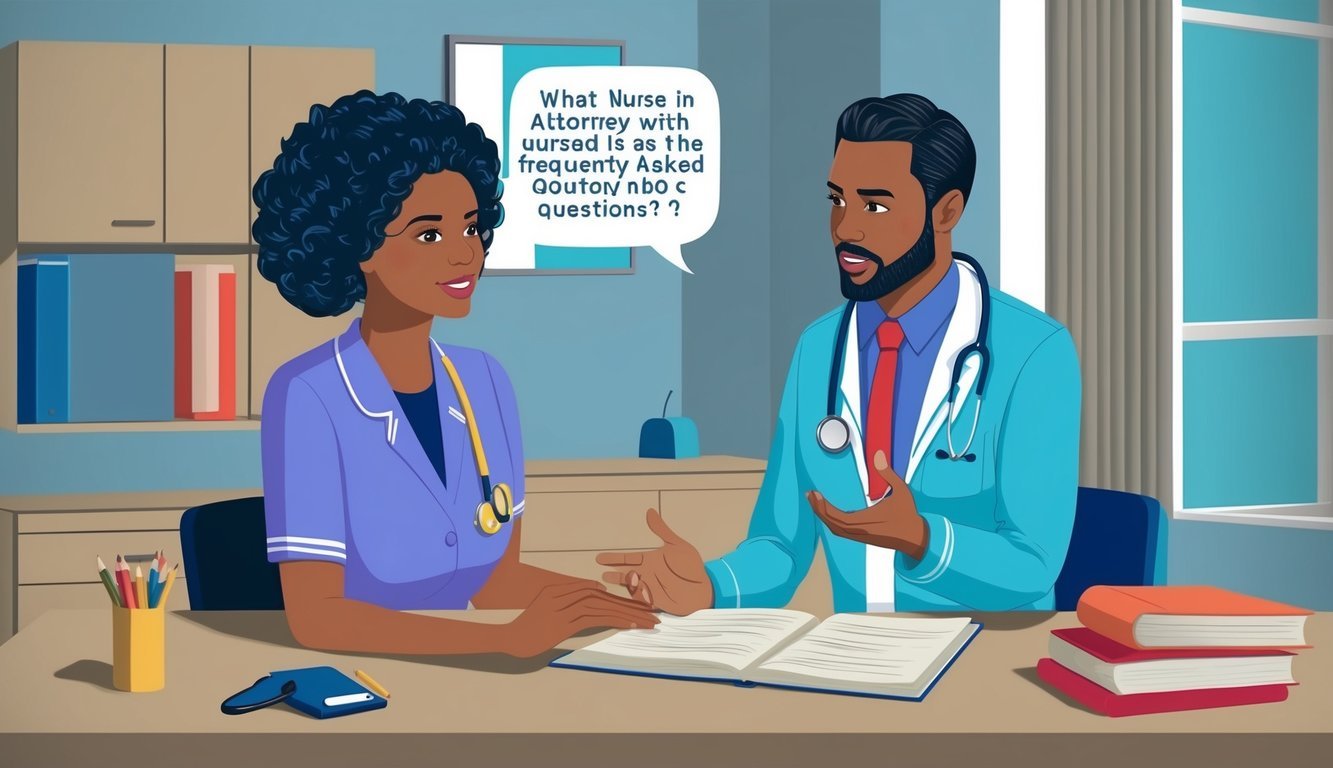A nurse attorney is a professional who combines expertise in both nursing and law to navigate complex issues in the healthcare field.
This unique career enables you to advocate for patients while understanding the legal aspects of healthcare, making it essential in today’s medical environment.
As healthcare regulations evolve, the role of nurse attorneys becomes increasingly vital for ensuring compliance and protecting patient rights.
To become a nurse attorney, you need to pursue education and training in both nursing and law.
This path offers diverse opportunities, including working in legal firms, healthcare organizations, or even starting your own practice.
The combination of skills allows you to address legal challenges related to patient care, healthcare policies, and medical malpractice.
In addition to a rewarding career assisting others, you can expect competitive salaries and varied specialties within the field.
Whether you are interested in healthcare regulations, hospital policies, or patient advocacy, becoming a nurse attorney offers numerous career paths and growth opportunities.
Key Takeaways
- Nurse attorneys blend nursing knowledge with legal expertise to enhance the healthcare sector.
- There are various specialties and employment opportunities in the nurse attorney field.
- The career offers competitive salaries and potential for professional development.
Becoming a Nurse Attorney
Becoming a nurse attorney combines two vital fields: nursing and law.
This career path requires specific educational qualifications, certification, and involvement in professional organizations.
Educational Pathways
To start, you must earn a nursing degree.
This can be an Associate Degree in Nursing (ADN) or a Bachelor of Science in Nursing (BSN) from an accredited program.
After completing your nursing education, you need to pass the NCLEX-RN exam to obtain your nursing license.
Next, you should pursue a law degree, specifically a Juris Doctor (JD).
Admission to law school often requires taking the Law School Admission Test (LSAT).
Complete your JD program, which typically takes three years.
Finally, some programs offer dual degrees in nursing and law, allowing you to earn both degrees concurrently.
This can save time and broaden your expertise.
Certification and Licensure
After obtaining your JD, you will need to pass the bar exam in your state.
Some jurisdictions use the Uniform Bar Exam, which allows you to practice in multiple states with one exam.
You may also consider obtaining additional certifications specific to nursing law.
Organizations like the American Association of Nurse Attorneys (TAANA) provide resources and education focused on the intersection of nursing and law.
Continuing education is crucial in this field.
Staying updated on legal changes and nursing practices can enhance your career prospects and professional growth.
Professional Organizations
Joining professional organizations can be valuable to your career as a nurse attorney.
The American Association of Nurse Attorneys (TAANA) focuses on providing resources, networking opportunities, and educational programs.
Membership in these organizations often gives you access to continuing education opportunities and updated legal resources.
This support network can help you stay informed about trends in nursing law.
Additionally, local and national legal associations can provide essential connections.
These networks may help you find job opportunities and mentorship in your dual career.
Engaging with these communities is a practical step in your journey.
Roles and Responsibilities
Nurse attorneys hold a unique position where healthcare meets law.
Their duties involve a blend of clinical understanding and legal expertise, which enables them to address various healthcare-related issues in different settings.
Clinical and Legal Expertise
As a nurse attorney, your background in nursing provides valuable insights into medical cases and practices.
You utilize your clinical experience to interpret complex medical records and understand patient care dynamics.
Your role often involves navigating healthcare law, which includes malpractice claims and regulatory compliance.
You may represent healthcare professionals in legal matters, use your legal knowledge to assist in litigation, or provide expert testimony as an expert witness.
This dual expertise enhances the protection of patient rights and supports healthcare policies.
Risk Management and Compliance
In risk management, you focus on identifying potential risks within healthcare settings.
You help facilities develop strategies to minimize those risks and ensure compliance with healthcare regulations.
Your knowledge of administrative law aids in guiding healthcare agencies and staff on regulatory compliance.
You analyze internal policies with a legal lens to help create effective risk management plans.
This ensures that healthcare professionals adhere to laws such as HIPAA and other healthcare regulations, ultimately improving patient safety.
Consulting and Advocacy
As a consultant, you provide guidance to healthcare organizations on legal and ethical issues.
You may assist in developing best practices for patient care and navigating complex healthcare policies.
Your insights help facilities avoid legal pitfalls.
In your advocacy role, you work to safeguard patient rights.
You may collaborate with government agencies to influence changes in healthcare laws.
Engaging in policy discussions allows you to promote better healthcare practices that benefit both patients and providers.
Your efforts can lead to improved outcomes in various healthcare settings.
Specialties within Nurse Attorney Careers

Nurse attorneys can focus on diverse areas of law that connect healthcare and legal systems.
Each specialty addresses unique challenges and requires specific knowledge of medical and legal practices.
Medical Malpractice and Personal Injury
In the realm of medical malpractice, nurse attorneys play a crucial role.
They assist clients who claim to have been harmed due to negligence by healthcare professionals.
These cases often involve complex medical information, making your nursing knowledge invaluable.
Your expertise allows you to analyze medical records, identify standard practices, and evaluate treatment outcomes.
You might serve as an expert witness, presenting findings in court.
Additionally, in personal injury cases, your insights can clarify how medical issues affect a client’s life and help seek appropriate compensation.
Family Law and Administrative Proceedings
Nurse attorneys also work within family law, addressing issues that affect health and well-being.
They deal with cases involving child custody, divorce, and domestic violence.
Understanding the healthcare implications of these situations is essential since emotional and physical health can be significantly impacted.
In administrative proceedings, you may represent clients against government bodies over licensure issues or regulatory compliance.
Your combination of nursing and legal knowledge equips you to navigate these complex regulations effectively.
Health Policy and Legislative Advocacy
Another important area for nurse attorneys is health policy and legislative advocacy.
In this role, you may engage with government agencies and lawmakers to influence health laws and policies.
Your nursing background provides insight into the practical impacts of proposed laws on healthcare delivery.
You might conduct research, prepare policy briefs, or testify in legislative hearings.
Your aim is to bridge the healthcare and legal communities, advocating for laws that enhance patient care and safety.
Staying informed about the ever-changing legal landscape is vital for successful advocacy.
Employment Opportunities and Career Growth
As a nurse attorney, you have diverse career paths available in various sectors.
Each offers unique opportunities for growth and development in both legal and healthcare fields.
Explore how you can leverage your skills in law and nursing to maximize your career potential.
Law Firms and Healthcare Organizations
Law firms often seek nurse attorneys to bridge the gap between legal and healthcare knowledge.
Your background gives you insight into medical practices, enabling you to provide specialized legal counsel in medical malpractice cases and compliance issues.
Many healthcare organizations also hire nurse attorneys to navigate regulatory requirements and manage risk effectively.
Key Responsibilities:
- Providing legal counsel on healthcare regulations.
- Assisting in malpractice litigation and claims.
The demand for nurse attorneys is growing due to an increasing focus on healthcare laws.
You can find positions in both private law firms and healthcare settings, ensuring your skills are always in demand.
Government and Educational Institutions
Government agencies frequently employ nurse attorneys to address healthcare policy and regulatory enforcement.
In these roles, you may work on legislative initiatives or manage legal aspects of public health programs.
Similarly, educational institutions value your expertise for teaching law-related courses in nursing programs.
Key Responsibilities:
- Drafting policies and regulations on healthcare delivery.
- Educating future healthcare professionals about legal issues.
Working in a government or educational setting can enhance your leadership skills.
It also provides the chance to influence healthcare policies and practices at a broader level.
Freelance and Consulting Services
Freelance writing or consulting can be a flexible career option for you as a nurse attorney.
Here, you can offer your expertise to law firms, healthcare organizations, or other entities needing legal guidance in health-related matters.
This path allows for personalized projects and the ability to set your own rates.
Key Opportunities:
- Consulting with healthcare organizations on compliance.
- Freelance writing for legal or healthcare publications.
In this role, you can shape your career based on your interests while helping clients understand complex legal issues.
By building a network within legal and healthcare communities, you can enhance your freelance opportunities.
Salary and Professional Development
As you consider a career as a nurse attorney, understanding salary trends and opportunities for professional growth is essential.
This section covers compensation factors, the importance of continuing education, and how networking can enhance your career.
Compensation Trends and Factors
The salary of a nurse attorney can vary significantly based on several factors such as location, experience, and specific roles within the field.
According to current data, an entry-level nurse attorney earns about $66,700 annually.
With some experience, this can increase to around $72,620 per year.
| Experience Level | Hourly Wage | Monthly Salary | Annual Salary |
|---|---|---|---|
| Entry-Level | $32.07 | $5,560 | $66,700 |
| 1-4 Years Experience | $34.91 | $6,050 | $72,620 |
| Average for Lawyers | N/A | N/A | $145,760 |
The demand for nurse attorneys is growing, which can impact salaries positively.
Factors such as the cost of living and specific jobs you take also play a significant role in determining your pay.
Continuing Education and Specializations
To stay competitive, you should consider pursuing additional education and specializations.
A nursing degree is foundational, but obtaining a law degree is crucial for your career as a nurse attorney.
You may also want to explore certifications in areas like healthcare law or medical malpractice.
These specializations can enhance your expertise and make you more attractive to potential employers.
Continuing education programs often offer flexible online options.
Look for accredited institutions that provide relevant courses to meet your professional goals.
Networking and Professional Membership
Joining professional organizations is vital for your career advancement.
Associations such as the American Association of Nurse Attorneys can provide valuable resources and networking opportunities.
By connecting with other professionals in the field, you can gain insights and access to job openings.
Membership in these organizations often comes with benefits like continuing education credits, workshops, and conferences to help you stay updated on industry trends.
Actively participating in events can enhance your visibility and open doors for career progression.
Building a robust professional network is essential.
Stay connected with your peers through online platforms and local meetings.
Your network can significantly impact your opportunities for career advancement.
Frequently Asked Questions

When considering a career as a nurse attorney, you may have several questions.
This section covers important topics like education, transition between professions, job responsibilities, and potential career paths.
What are the educational requirements for becoming a nurse attorney?
To become a nurse attorney, you need both a nursing degree and a law degree.
Typically, you must first earn a Bachelor of Science in Nursing (BSN) and become a registered nurse (RN).
Then, you can attend law school to obtain your Juris Doctor (JD) degree.
How does one transition from a career in nursing to practicing law?
Transitioning from nursing to law involves several steps.
After working as an RN, you can apply to law school.
Many programs value your nursing background, as it brings unique insights.
Completing an internship in healthcare law can also smooth your transition.
What is the role and typical responsibilities of a legal nurse consultant?
A legal nurse consultant acts as a bridge between the medical and legal fields.
You analyze medical records, provide expert opinions, and assist in preparing legal cases.
Your nursing background helps clarify complex medical information for attorneys.
What are the potential career paths for nurse attorneys?
Nurse attorneys have diverse career options.
You can work in healthcare law, risk management, or hospital administration.
Some may also specialize in malpractice cases or regulatory compliance, giving you many avenues for career advancement.
Is pursuing a law degree a beneficial move for a seasoned nurse?
Yes, pursuing a law degree can be beneficial for experienced nurses.
It opens new career opportunities and enhances your understanding of legal matters in healthcare.
This additional knowledge can improve your career prospects and help you contribute more effectively in any healthcare setting.
What does the designation JD RN signify in the context of healthcare and law?
The designation JD RN refers to someone who is both a registered nurse and holds a Juris Doctor degree.
This combination signifies expertise in both nursing and legal matters.
It makes you a valuable asset in legal settings involving healthcare issues.

